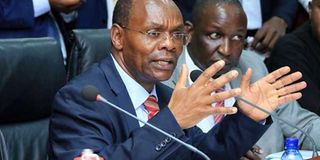Slaying corruption monster will require more than empty threats

Kebs MD Charles Ongwae respond to questions from MPs about the contraband sugar that is in the county on June 21, 2018. FILE PHOTO | NATION MEDIA GROUP
What you need to know:
Forensic investigation and collection of evidence is also a vital prong.
DPP Noordin Haji must follow up his gusto by building the capacity to investigate and gather adequate evidence.
It is timely to stand back and take stock of the state of corruption in Kenya and the progress in the war against it.
First, it is clear that the momentum of exposures and revelations is gathering pace with the media and social media at the forefront of driving it.
Since I wrote on this subject a month ago, the public has been treated to a rich menu of revelations of scams covering many entities and individuals.
It is no longer just NYS II but many others: NCPB, Kenya Pipeline, Kebs, various sugar companies and importation of a billion kilogrammes of varying qualities of sugar in a mere six months, to name but a few.
Depending on the size of the beast of corruption, it is no surprise that it can shave off at least a couple of percentage points of economic growth every year. Consider how much of the government’s recurrent expenditure on goods and services is lost to corruption.
POVERTY
It also entrenches poverty in the rural areas — as has been witnessed by the many farmers with unsold maize and sugar. Some accounts claim the players go far and deep, extending even to the President’s own family.
What started as a relatively isolated storm has turned into a hurricane that is pounding the entire country. If it was intended to be a carefully controlled public relations exercise with the pretence that corruption was being tackled, then it has gone horribly awry.
And the argument that corruption is “in the DNA” of every Kenyan and is, therefore, part and parcel of life is a rather shallow one. The blunt reality is that it is part and parcel of every Kenyan’s life because it is impossible for one to get through a single day without it.
Even if one is not directly corrupt, they are indirectly aiding and abetting corruption because of interacting with different people and places. Is the public transport many rely on not a constant target of extortion and corruption?
CORRUPTION
Indeed, it is good to look at corruption from the viewpoint of bottom up. Kenya is a very unequal society. According to Oxfam, less than 0.1 per cent of the population, 8,300 people, own more wealth than the bottom 99.99 per cent. No wonder deep down there is burning resentment among Kenyans on how graft makes life more and more difficult, expensive and stressful.
The way to challenge, reduce and make corruption unattractive should be multipronged. There has been much debate about the value of lifestyle audits. They certainly have a role and should become one of the major prongs. But there are two caveats: The capacity to conduct them must be built up expeditiously and they should be conducted by an independent body that has no vested interest in the entity.
Another is to follow and capture the money. These billions are not stashed under beds; they have gone into and through banks under the regulation of the Central Bank of Kenya. Tracing it is not rocket science.
And there is plenty of capacity worldwide. CBK would be a willing party in such an operation because providing information as prosecution evidence is vital.
INVESTIGATION
Forensic investigation and collection of evidence is also a vital prong. Many a case has failed to achieve a conviction because the evidence was insufficient and not because the relevant party was innocent.
DPP Noordin Haji must follow up his gusto by building the capacity to investigate and gather adequate evidence.
With due respect, there is some doubt as to whether the agency can competently, adequately and successfully prosecute such an avalanche of cases without an immediate boost to its capacity. The most expeditious way to enhance capacity is to borrow the skills.
Bring in forensic auditors and professional investigators from willing partners and bodies such as the Scotland Yard and FBI.
Another prong is to do a thorough independent evaluation of all proposed projects.
VALUE FOR MONEY
This involves value for money and the added value it will bring. For example, we are told SGR II to Naivasha will cost Sh150 billion.
An independent audit needs to be done and the figures broken down to show us exactly what we are getting for this money. Proposed projects that fail the test would be scrapped.
Last but not the least, the Chief Justice and the Judiciary must ensure the capacity to try these cases without delay.
Mr Shaw is a public policy and economic analyst and a former member of the Board of Transparency International (Kenya). [email protected]





